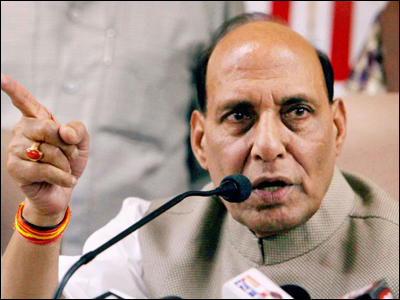Srinagar/Jammu, Sep 7: The land for rehabilitation of displaced Kashmiri Pandits, who migrated from the Kashmir valley in the early 1990's due to militancy, can be identified in one or two months, home minister Rajnath Singh said on Saturday.
 "We are committed to the rehabilitation of Kashmiri Pandits who have migrated from the valley. The state government can start the process of identifying the land for their rehabilitation after the floods. They can identify land in one month or two months after dealing with floods," he told reporters here.
"We are committed to the rehabilitation of Kashmiri Pandits who have migrated from the valley. The state government can start the process of identifying the land for their rehabilitation after the floods. They can identify land in one month or two months after dealing with floods," he told reporters here.
Singh was on a day-long tour to Jammu and Kashmir during which he made an aerial survey of flood affected areas of the state.
The home minister said the Central government has already earmarked Rs 500 crore (in general budget) for rehabilitation of Kashmiri Pandits in the valley.
Asked whether it was proper to write a letter to chief minister Omar Abdullah asking him to identify land in the midst of floods, the home minister said there was nothing wrong in sending the letter as the process was initiated even before the state was hit by floods.
"The letter has gone in the normal course. The letter only means the process has begun," he said.
The home minister on Friday asked the Jammu and Kashmir government to identify "suitable land" for the rehabilitation of some three lakh Kashmiri Pandits who migrated from the Kashmir valley in the early 1990's due to militancy.
The Narendra Modi government has committed itself to the return of some 62,000 Kashmiri Pandit families with "full dignity" to their homes in the Valley and has earmarked Rs 500 crore for this in the 2014-15 Union budget.
In his letter to Abdullah, the home minister has suggested that the land may be identified near the native place from where they migrated and also advised that this should be done in such a manner there was adequate security in and around the area.
At present, there are about 62,000 registered Kashmiri families who migrated from the Kashmir valley to either Jammu, Delhi or to other parts of the country after the onset of militancy in the border state.
Singh's missive came ahead of the state assembly elections likely to be held in November-December this year for which BJP has declared its intention to seek a majority in the 87-member legislature, a target not easy to achieve.
Asked about rehabilitation of refugees who have migrated from Pakistan since 1947, the home minister said the government will come up with plans for them very soon.





Comments
Add new comment